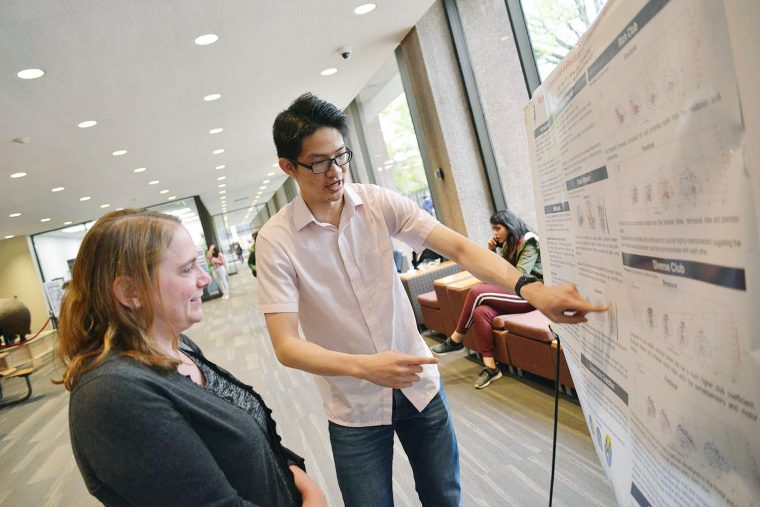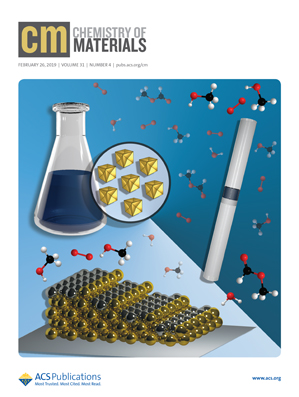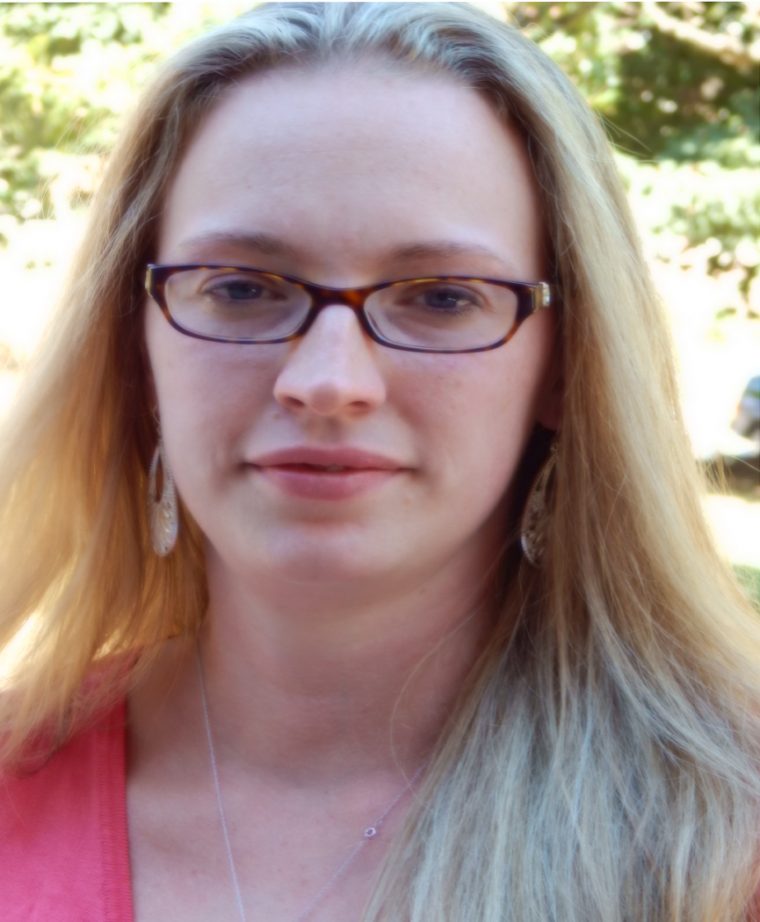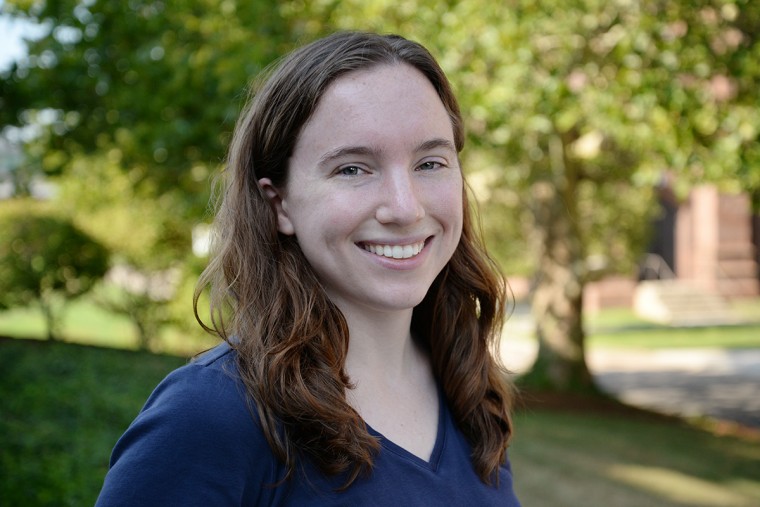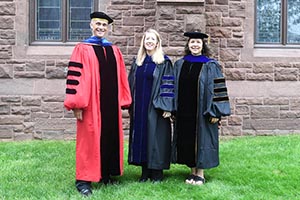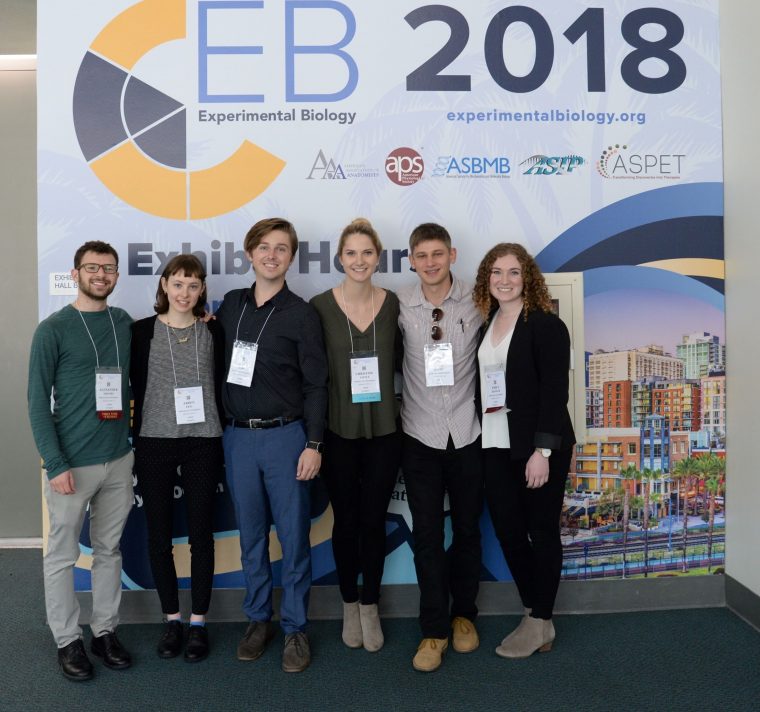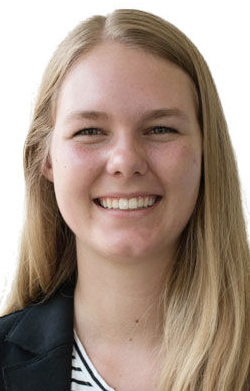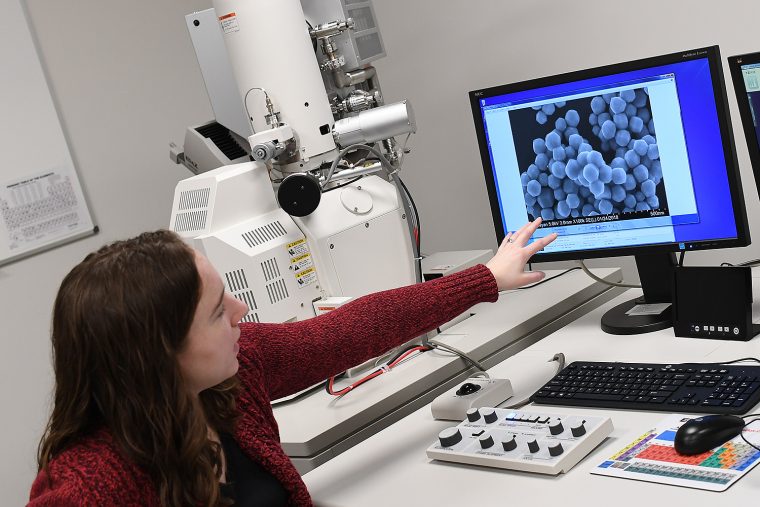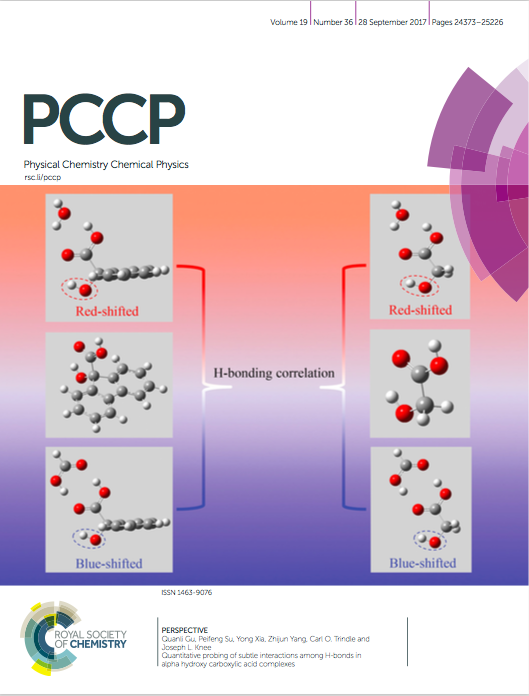An invited perspective article written by Michelle Personick, assistant professor of chemistry, and Danny Robertson ’18 is featured on the cover of the Feb. 26, 2019, issue 4 of Chemistry of Materials. Personick was invited to contribute the perspective article as part of Chemistry of Materials’ “Up-and-Coming” series of Perspectives. The series provides a place for emerging, early career scientists to discuss and provide insights into new areas of materials science, and to showcase their research accomplishments. The perspective, titled "Growing Nanoscale Model Surfaces to Enable Correlation of Catalytic Behavior Across Dissimilar Reaction Environments," highlights recent advances and potential future directions in the…
Melissa King, a PhD student in chemistry, and Michelle Personick, assistant professor of chemistry, are the coauthors of a study titled "Iodide-induced differential control of metal ion reduction rates: synthesis of terraced palladium–copper nanoparticles with dilute bimetallic surfaces," published in Journal of Materials Chemistry A, August 2018. In this paper, King and Personick report the use of low concentrations of iodide ions as a means of differentially controlling the reduction rates of a noble metal (palladium) and a non-noble metal (copper). The iodide in this system increases the rate of reduction of palladium ions while concurrently slowing the rate of…
Michelle Personick, assistant professor of chemistry, is the recipient of a three-year, $339,000 Young Investigator Program grant funded by the U.S. Army Research Office. Personick will use the funds to support her nanoparticle research, which ultimately may protect military soldiers from hazardous chemicals and materials. The Army’s Young Investigator Program is designed to identify and support talented scientists and engineers who show exceptional promise for doing creative research, in order to encourage their teaching and research careers. The program is open to U.S. citizens, Nationals, and resident aliens holding tenure-track positions at U.S. universities and colleges, who have held their graduate…
During Wesleyan’s 186th commencement ceremony on May 27, Wesleyan presented outstanding teachers with the Binswanger Prize for Excellence in Teaching. These prizes, made possible by gifts from the family of the late Frank G. Binswanger Sr., Hon. ’85, underscore Wesleyan’s commitment to its scholar-teachers, who are responsible for the University’s distinctive approach to liberal arts education. Recommendations are solicited from alumni of the last 10 graduating classes, as well as current juniors, seniors, and graduate students. Recipients are chosen by a selection committee of faculty and members of the Alumni Association Executive Committee. This year, Wesleyan honored the following faculty…
Seven Wesleyan students recently were inducted into the American Society for Biochemistry and Molecular Biology (ASBMB) Honor Society, and many of them presented research posters at the ASBMB annual meeting in San Diego, April 21–25. The ASBMB Honor Society recognizes exceptional undergraduate juniors and seniors who are pursuing a degree in the molecular life sciences for their scholarly achievement, research accomplishments, and outreach activities. The Wesleyan students inducted were Will Barr '18, Alexa Strauss '19, Emily Kessler '18, Christine Little '18, Julie McDonald '18, Rubye Peyser '18, and Alexander Shames '18. The following students attended the annual meeting: • Kessler, whose poster was…
(more…)
Chemistry and environmental studies major Kate Sundberg ’20, one of 20 students nationwide who are part of the Friends Committee on National Legislation Advocacy Corps, attended the Spring Lobby Weekend on March 17–20 advocating for immigration policy with Congress. The Advocacy Corps is a yearlong program where young adults between the ages of 19–30 organize their local communities around federal legislation. As an organizer, Sundberg connects local activists and leaders with Congress to affect meaningful, bipartisan climate action. (more…)
Erika Taylor, associate professor of chemistry, is the recent co-author of three articles. Two publications are related to disrupting the formation of Lipopolysaccharides (LPSs), a cell surface component that is important to Gram-Negative bacteria’s ability to form biofilms and become resistant to hydrophobic antibiotics. These papers describe inhibition of enzymes from E. coli, as well as enzymes from related pathogens including Vibrio cholerae (the bacteria that causes cholera), and Yersinia pestis (the bacteria that causes plague). Understanding how enzymes can be inhibited opens up possible new strategies for fighting diseases. The third paper builds on her prior work investigating the…
By using a newly acquired electron microscope, the E&ES 368 Meteorites and Cosmochemistry class was able to classify a meteorite discovered in Morocco. "We were able to determine that it was an H4 ordinary chondrite, and the chemical information being collected today will be used to document these findings and submit this meteorite to the Meteorite Nomenclature Committee of the Meteoritical Society for official classification," said class instructor Jim Greenwood, assistant professor of earth and environmental sciences. Wesleyan acquired the field-emission scanning electron microscope (FE-SEM) with support from a $202,300 National Science Foundation grant awarded in August 2017. Greenwood and Michelle Personick,…
Joseph Knee, the Beach Professor of Chemistry and Dean of the Natural Sciences and Mathematics Division, is the author of a new article published in the journal Physical Chemistry Chemical Physics (PCCP). This "Perspectives" article, which was commissioned by the PCCP editorial board and editorial office, is a high-profile look at work by Knee and his collaborators that has been going on for nearly a decade. Perspectives articles are intended to present an authoritative state-of-the-art account of a particular research field. The research by Knee and his collaborators, which is ongoing, uses experimental and computational methods to explore hydrogen bonding interactions, which are extremely important in the…
In this Q&A, we speak with Michelle Personick, assistant professor of chemistry, assistant professor of integrative sciences. Personick, who joined the faculty at Wesleyan in 2015, is interested in developing tailored metal nanomaterials that improve the clean production of energy and enable the efficient use of energy resources. Her work has recently been published in the journals Particle and Particle Systems Characterization and American Chemical Society Catalysis. Q: Professor Personick, how would you describe your main research interests? A: The main research areas in my group are controlling the shape and composition of noble metal nanocrystals, and exploring the use of these nanoparticles…


